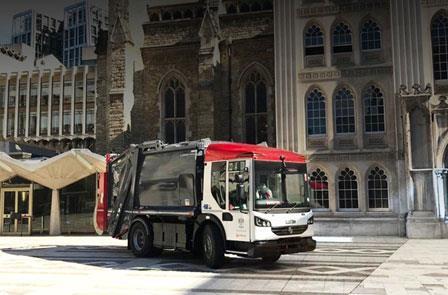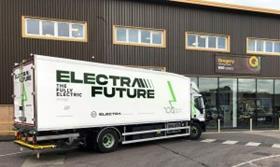
As cities globally seek to improve air quality, attention has turned to road transport and its role in eliminating harmful emissions. London’s Ultra Low Emission Zone and the planned roll-out of regional clean air zones in cities will see operators hit with strict regulations for mitigating the environmental impact of their fleets.
One sector that particularly finds itself in the spotlight when it comes to operating in dense, urban areas is waste and recycling.
Refuse collection vehicles are unique in that they are high fuel consumption and low mileage, and because of their low speed, can be high producers of emissions; even Euro-6 may not get hot enough to burn the particulates off.
In addition to emissions, the noise of the vehicle with its engine idling can also cause a disturbance within residential and business areas.
Overcoming challenges
Blackburn-based Electra Commercial Vehicles believes it has the solution for waste operators in the form of its all-electric RCV.
In a unique partnership, Electra works closely with three major manufacturers that manufacture ‘glider’ chassis to Electra’s specification. These are factory-produced chassis without an engine, gearbox, fuel system, AdBlue system or exhaust system.
Focusing on popular low-entry chassis for city refuse collections, the gliders used by Electra are the Mercedes-Benz Econic platform, Iveco Eurocargo and Dennis Eagle Elite. All three manufacturers have given Electra full access to their systems, including CANbus, so important areas such as automatic braking and lane assist are not impacted by the chassis being electrified.
Electra has also developed its own electric power take-off (e-PTO) to operate refuse bodies, fridges, cranes and other engine-driven applications.

As a final major coup, Electra has announced it now has Type Approval for its electric chassis. “This is very exciting news for us,” says group commercial director Russell Markstein, pictured. “The large truck manufacturers that spend millions of euros each year on R&D have worked with us to achieve this – it’s very much a collaboration.
“Now we have Type Approval from the VCA on our electric chassis, it’s not classed as a conversion anymore. The trucks can simply go into a dealership if there’s a warranty issue, just like a traditional diesel variant.”
Electra is also affiliated to sister firm Riverside Truck Rental, with further backup provided from engineers all trained to Level 4 on EV maintenance.
Industry appetite
Despite the disruption of the past year’s Covid-19 pandemic, Electra has remained operational throughout and is this year on track to roll out a bumper tally of vehicles to operators.
Public sector demand has been growing, with both the City of London and Greater Manchester councils placing multi-vehicle orders for their waste fleets.
The City of London, through its subcontractor Veolia, is now operating seven Electra bin lorries based on the Dennis Eagle Elite chassis, becoming the first local authority in the UK with a fully electric waste fleet.
Meanwhile, the City of Manchester, through its subcontractor Biffa, has conducted a successful 12-month trial with a 26-tonne Electra refuse truck, based on the Mercedes-Benz Trucks Econic chassis.
Fitted with a 200kWh battery, the truck is charged overnight at the council’s depot, goes out to collect 10 tonnes of waste, discharges the load and then collects another 10 tonnes before returning to the depot.
Averaging 1,600 bin movements a day, this is all done on a single charge and carrying the same payload as its diesel equivalent. The average fuel cost for a diesel vehicle on this operation is approximately £100 per day, says Electra, whereas it now costs £12 per day in electricity.
Manchester is now poised to take delivery of 27 Electra RCVs in total, which will be delivered to the council by the end of March.
Many smaller local authorities have also started to dip a toe into the water, such as single-truck orders from North Lanarkshire Council, Highways Scotland, Waltham Forest and Stockton on Tees, while more are looking to trial the technology this year.
“There’s quite a lot of demand from the municipal sector, because refuse vehicles are such high polluters. We think every council will probably have at least one on their fleets in the next five years,” says Markstein.
And with the strong order pipeline already in place for the next 12 months, Electra believes it will be supplying around 10% of new waste sector trucks by the end of 2021.
Branching out
But the potential for Electra’s technology doesn’t just stop at the waste sector. Interest has been growing from fleet managers in a range of different operations, from temperature-controlled food deliveries to construction businesses.
Reynolds Catering, for example, has been operating an Electra refrigerated trailer for more than a year. It features a 60kWh battery, which uses approximately 17kWh to get to -22C and then operates at 3kWh, excluding the power generated from its fabric solar panels.
Historically, a trailer of this nature would have operated using a diesel auxiliary engine, irrespective of whether it was stationary or being driven, and the environmental impact can be significant, says Electra.
“Operating a traditional diesel-powered fridge, you use a lot of fuel even when the truck’s not operating by keeping it temperature controlled,” says Markstein.
“And obviously the other area that people don’t pick up on is that a traditional fridge can be very noisy. With Electra, it’s now virtually silent, which would be better for night-time deliveries or in residential areas.”

Meanwhile, Gregory Distribution, in partnership with customer Brewdog, is trialling the UK’s first 19-tonne rigid Electra e-Cargo urban refrigeration vehicle, based on an Iveco Eurocargo chassis.
A test model of the electric truck is currently being deployed in different urban delivery scenarios. This will be followed by a permanent Electra e-Cargo joining the fleet this spring to be used making zero-emission deliveries to Brewdog’s central London bars by Gregory division ARR Craib Transport.
“We’re also building a construction vehicle,” says Markstein. “We’re designing an eight-wheel tipper grab for one of our customers on the Econic platform.”
In the aviation sector, Electra is building a scissor-lift vehicle for zero-emission transportation of catering supplies to aircraft.
What many of these sectors have in common, says Markstein, is low-mileage, back-to-hub operation, or reverse logistics. “At the moment you have to look at your operation and accept that in certain applications, EV won’t work. Whatever the pressures are on alternative fuels, it has to be deliverable,” says Markstein.
“But unfortunately legislation is often way ahead of technology. If you look at clean air zones, for example, putting charges in place doesn’t help when operators have no alternatives to diesel.”
Marketplace
Electra’s proposition means it can tailor-make its technology to suit different customers’ requirements.
This, Markstein believes, will stand the company in good stead to compete as other major truck manufacturers move further into the EV market.
“That’s why we’ve got a slight edge when you asked about the OEMs,” he says. “For customers, it’s often got to be very specific. We might not always have the buying power, but somehow it works as we probably have greater flexibility. We can produce an electric truck in 19 working days because we get the chassis and it is literally a case of bolting on the componentry such as the motors, the PTO and the batteries.”
But collaboration still remains key, with Electra and major European OEMs working hand in hand to drive forward the development of electric options for the freight sector. “Some of those are looking at us as technology partners,” says Markstein.
The deadline to enter the 2021 MT Awards is 9 April. Go to the website for full details on how to enter.











